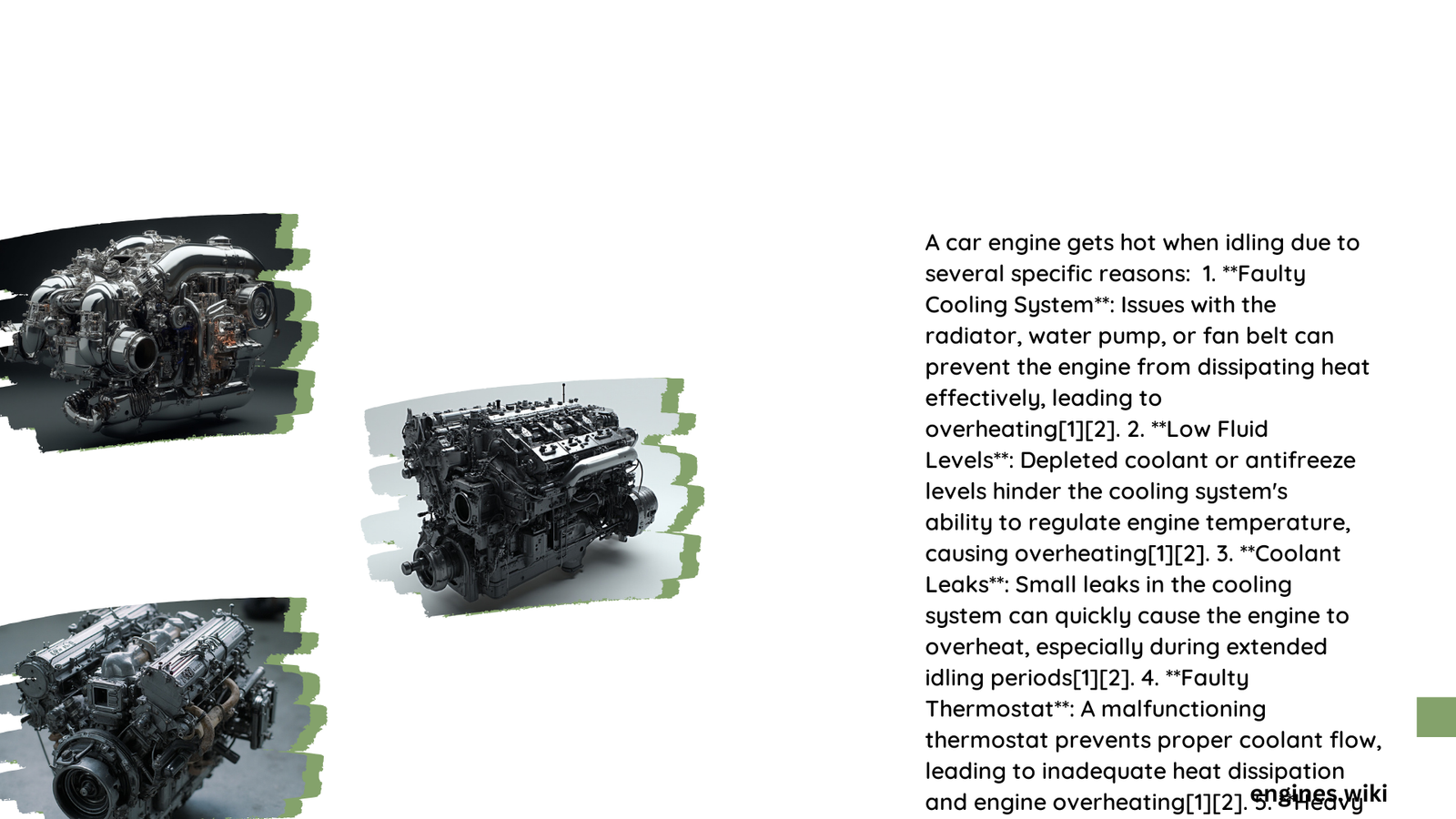An overheating engine while idling is a common issue that can lead to severe damage if left unaddressed. This problem occurs when the engine’s cooling system fails to maintain optimal temperature at low RPMs. Various factors, including coolant leaks, faulty radiator fans, or thermostat malfunctions, can cause a car engine to get hot when idle. Understanding the causes, recognizing symptoms, and knowing how to manage this issue is crucial for maintaining your vehicle’s health and preventing costly repairs.
Why Does My Car Engine Get Hot When Idle?
When a car engine gets hot while idling, it’s often due to a malfunction in the cooling system or related components. Here are the primary reasons:
- Cooling System Issues: A faulty cooling system is the most common culprit. This can include:
- Low coolant levels
- Coolant leaks
- Malfunctioning water pump
-
Clogged radiator
-
Radiator Fan Problems: The radiator fan is crucial for cooling when the car is stationary. If it’s not working correctly, the engine can overheat quickly.
-
Thermostat Malfunction: A stuck thermostat can prevent proper coolant circulation, leading to overheating.
-
Fan Belt Issues: A loose or damaged fan belt can prevent the radiator fan from operating efficiently.
-
Idle RPM and Engine Heat: At idle, there’s less airflow to cool the engine naturally, making the cooling system’s role more critical.
What Are the Symptoms of an Engine Overheating at Idle?

Recognizing the signs of an overheating engine is crucial for preventing severe damage. Look out for these symptoms:
- Temperature gauge reading above normal (typically over 220°F or 104°C)
- Steam or smoke from under the hood
- Sweet, syrupy smell (indicating coolant leak)
- Engine warning light on the dashboard
- Reduced engine performance or power
How Can I Diagnose the Cause of My Engine Overheating at Idle?
To pinpoint the reason your car engine gets hot when idle, follow these diagnostic steps:
-
Check Coolant Levels: Ensure the coolant reservoir is filled to the appropriate level.
-
Inspect for Leaks: Look for coolant puddles under the car or visible leaks in the engine bay.
-
Examine the Radiator Fan: With the engine running and stationary, check if the radiator fan is operating.
-
Test the Thermostat: A simple test can determine if the thermostat is opening and closing correctly.
-
Assess the Water Pump: Listen for unusual noises that might indicate a failing water pump.
What Are the Potential Consequences of Ignoring an Overheating Engine?
Ignoring an overheating engine can lead to severe and costly consequences:
- Warped cylinder heads
- Blown head gaskets
- Cracked engine block
- Seized engine (requiring complete replacement)
How Can I Prevent My Car Engine from Getting Hot When Idle?
Preventive measures can help avoid overheating issues:
-
Regular Maintenance: Follow your vehicle’s recommended maintenance schedule.
-
Coolant Checks: Regularly inspect coolant levels and quality.
-
Radiator Care: Keep the radiator clean and free from debris.
-
Belt Inspections: Check and replace belts as needed.
-
Thermostat Replacement: Replace the thermostat at recommended intervals.
What Should I Do If My Engine Starts Overheating While Idling?
If you notice your engine temperature rising while idling:
- Turn off the air conditioning and turn on the heater (to draw heat away from the engine).
- If safe, rev the engine slightly to increase coolant circulation.
- If temperature continues to rise, turn off the engine and call for assistance.
How Much Does It Cost to Fix an Overheating Engine?
The cost to repair an overheating engine varies based on the underlying cause:
| Issue | Estimated Cost Range |
|---|---|
| Coolant Leak Repair | $100 – $900 |
| Radiator Fan Replacement | $300 – $700 |
| Thermostat Replacement | $200 – $500 |
| Water Pump Replacement | $400 – $800 |
| Head Gasket Replacement | $1,000 – $2,500 |
Can I Drive My Car If the Engine Gets Hot When Idle?
It’s not recommended to drive a car with an overheating engine. Continuing to operate an overheating vehicle can cause severe and expensive damage. If you must drive, do so for only short distances and monitor the temperature gauge closely.
Remember, addressing the issue promptly when you notice your car engine gets hot when idle can save you from more significant problems and expenses down the road. Regular maintenance and attentiveness to your vehicle’s performance are key to preventing and managing overheating issues.
References:
1. 1A Auto Blog: Car Overheats When Idling? – Signs of an Engine Overheating
2. York Dodge Blog: 5 Reasons Your Car Is Overheating When Idle
3. CarParts.com Blog: What Causes a Car to Overheat When Idling?
